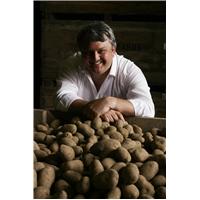
London Four out of five British people don’t trust food manufacturers to tell the truth, according to new research from Kettle® Chips.
In response, KETTLE has teamed up with Essex farmer and star of the BBC’s Jimmy’s Farm – Jimmy Doherty, to call for more honesty and quality in the food industry.
Of the thousand people surveyed:
78% said they didn’t trust manufacturers to always tell the truth about how food was produced
70% say they now always check food labels before buying – the main areas for
concern being calorie/fat/sugar levels (55.2%), artificial additives (48.2%), and to make sure all ingredients are real (18.4%)
Half the population have now made a conscious decision to cut artificial ingredients from their diets
Two thirds are happy to pay extra for food made from real ingredients, showing a real reversal from the price-focused shopper of old 20% of British households buy food at Farmers’ Markets (this figure has doubled since the 1980’s)
People in their forties and fifties are 75% more likely to shop at Farmers Markets than people in their twenties
Farmer Jimmy Doherty, star of hit BBC show Jimmy’s Farm comments:
“It’s becoming clear that the British public has had enough and are not prepared to take their food at face value anymore. Clear labelling and honest communications are vital if food manufactures want to rebuild this trust. Producing high quality food, with a traceable, transparent chain is my passion and it’s great to see shoppers supporting companies who take quality ingredients seriously.”
The news that almost 80% of people don’t believe manufacturers are always honest about their food is shocking, but it may indicate why Kettle® Chips are still the UK’s favourite hand cooked chips. Since the company started in the UK in 1988, it has only ever used 100% natural ingredients in all of their products.
Jeremy Bradle, Managing Director at Kettle® Chips (pictured right) comments:
“Kettle Foods was started by a guy who believed there may be a group of people who would want snacks that were made with a greater degree of care, tasted better and contained absolutely no artificial ingredients. Although it was always going to be a tougher route to follow, he also wanted us to know where the ingredients came from and to be honest with people about what was in the food we sold. We’ve been working at that ambition for 27 years now. Looking at the results of the survey, it seems food manufactures need to try harder than ever to earn the right to consumers trust and that Cameron’s* original hunch is more relevant today than it’s ever been.”
*Cameron Healy, founder of Kettle Foods
Regional Statistics
· People from West Midlands are the most trusting. Only 26.9% say they don’t think food manufacturers are always honest about how their food is made. Compare this with the Northwest of the country, where the figure was 95%!
· People in the South We! st of th e country are much more likely to visit Farmer’s Markets for their food 50%, compared to 20.8% for the country as a whole.
· Londoners shop organically more than people from any other area (34.4%). The further north you go, the less likely you are to find an organic shopper (Yorkshire 15.7%, North East 12.8%, Scotland 6.7%).
Kettle Survey: Key Statistics
· Forty two percent of household shoppers check where food has come from before they buy.
· Almost a quarter of households shop organically (only 3 percent say this was something they did in the 1980s).
· Twenty percent of British households buy food at Farmers Markets (only half of that number did in the 1980s)
· Around four out of five people say they sometimes feel food manufacturers aren’t entirely honest about how food is produced.
· Seventy two percent want to know if there are any additives or preservatives in their food.
· Almost two thirds are willing to pay a bit more for food that is made from real ingredients.
· Almost half of people have made a conscious decision to try to cut out anything artificial from their diet.
· Less than three out of ten people believe that if you want healthier food, you tend to have to compromise on taste.
· Seven out of ten people check the label on food products before buying. People check for a variety of things, including artificial additives (48.2%), calorie/fat/sugar content (55.2%), and to make sure ingredients are real (18.4%).
· Not surprisingly, women are more likely to check labels for fat, sugar and calorie content, but the gap isn’t as big as you might think 45.2% of men will check for these, compared to 60.2% of women.
· People in their forties and fifties are 75% more likely to shop at a Farmer’s Market than people in their twenties and thirties.
· When asked to guess how many dif! ferent t ypes of potato are in the world, guesses ranged from one to one thousand. The average guess was 16 (there are over 4,000).
1. A total of 998 face-to-face interviews were carried out by research firm Kember Associates, with consumers who claimed to shop regularly for food for themselves and/or their families. The interviews were carried out in major high streets throughout the country during June 2006.
2. In the event exact figures aren’t quoted, these are available from the above contacts.
